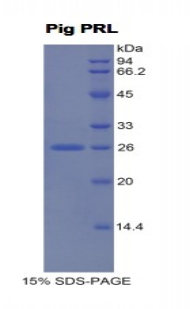Recombinant Prolactin (PRL)
LTH; Luteotropic Hormone
- Product No.RPA846Po01
- Organism SpeciesSus scrofa; Porcine (Pig) Same name, Different species.
- SourceProkaryotic expression
- HostE.coli
- Endotoxin Level<1.0EU per 1µg (determined by the LAL method)
- Subcellular LocationSecreted
- Predicted Molecular Mass26.7kDa
- Accurate Molecular Mass27kDa(Analysis of differences refer to the manual)
- Residues & TagsLeu31~Cys229 with N-terminal His Tag
- Buffer Formulation20mM Tris, 150mM NaCl, pH8.0, containing 1mM EDTA, 1mM DTT, 0.01% SKL, 5% Trehalose and Proclin300.
- Traits Freeze-dried powder
- Purity> 90%
- Isoelectric Point6.6
-
Applications
Positive Control; Immunogen; SDS-PAGE; WB.
If bio-activity of the protein is needed, please check active protein. - DownloadInstruction Manual
- UOM 10µg50µg 200µg 1mg 5mg
- FOB
US$ 216
US$ 540
US$ 1080
US$ 3240
US$ 8100
For more details, please contact local distributors!
SEQUENCE

USAGE
Reconstitute in 20mM Tris, 150mM NaCl (pH8.0) to a concentration of 0.1-1.0 mg/mL. Do not vortex.
STORAGE
Avoid repeated freeze/thaw cycles. Store at 2-8°C for one month. Aliquot and store at -80°C for 12 months.
STABILITY
The thermal stability is described by the loss rate. The loss rate was determined by accelerated thermal degradation test, that is, incubate the protein at 37°C for 48h, and no obvious degradation and precipitation were observed. The loss rate is less than 5% within the expiration date under appropriate storage condition.
GIVEAWAYS
INCREMENT SERVICES
-
 Endotoxin Removal Kit
Endotoxin Removal Kit
-
 BCA Protein Quantification Kit
BCA Protein Quantification Kit
-
 Protein Labeling Customized Service
Protein Labeling Customized Service
-
 Molecular Mass Marker for Protein
Molecular Mass Marker for Protein
-
 Recombinant Protein Customized Service
Recombinant Protein Customized Service
-
 Monoclonal Antibody Customized Service
Monoclonal Antibody Customized Service
-
 Polyclonal Antibody Customized Service
Polyclonal Antibody Customized Service
-
 Protein Activity Test Experiment Service
Protein Activity Test Experiment Service
-
 Immunoprecipitation (IP) Experiment Service
Immunoprecipitation (IP) Experiment Service
-
 Buffer
Buffer
-
 Endotoxin Removal Kit II
Endotoxin Removal Kit II
-
 Real Time PCR Experimental Service
Real Time PCR Experimental Service
-
 Spike RBD Protein (S-RBD)
Spike RBD Protein (S-RBD)
-
 Protein G
Protein G
-
 Protein A
Protein A
| Magazine | Citations |
| The Journal of Biological Chemistry | In Vivo Evidence for Epidermal Growth Factor Receptor (EGFR)-mediated Release of Prolactin from the Pituitary Gland Jcb: 39297 |
| Journal of Clinical Neuroscience | TLR9 expression is associated with prognosis in patients with glioblastoma multiforme ScienceDirect: S0967586811003572 |
| Sensors and Actuators B: Chemical | Determination of prolactin hormone in serum and urine using an electrochemical immunosensor based on poly(pyrrolepropionic acid)/carbon nanotubes hybrid modified electrodes Sciencedirect:S0925400514000720 |
| Veterinary Word | Effect of extended photoperiod during winter on growth and onset of puberty in Murrah buffalo heifers Pubmed:27051212 |
| Journal of Dairy Science | Effect of thermal stress on physiological, hormonal and haematological parameters in Tharparkar and Karan Fries calves publication:306322503 |
| Stem Cell Research & Therapy | Differentiation of human umbilical cord Wharton’s jelly-derived mesenchymal stem cells into endometrial cells pubmed:29096715 |
| Stem Cell Research & Therapy | The role of mesenchymal stem cells in chemotherapy-induced gonadotoxicity Pubmed:30021657 |
| Frontiers in Molecular Neuroscience | Impact of Triclosan on Female Reproduction through Reducing Thyroid Hormones to Suppress Hypothalamic Kisspeptin Neurons in Mice Pubmed:29403355 |
| Toxicology and Applied Pharmacology | The antipsychotics sulpiride induces fatty liver in rats via phosphorylation of insulin receptor substrate-1 at Serine 307-mediated adipose tissue insulin resistance Pubmed:29551354 |
| Journal of Cellular Biochemistry | The prolactin‐release inhibitor paeoniflorin suppresses proliferation and induces apoptosis in prolactinoma cells via the mitochondria‐dependent pathway Pubmed:29388711 |
| Journal of Cellular and Molecular Medicine | Metformin inhibits growth and prolactin secretion of pituitary prolactinoma cells and xenografts Pubmed: 30334324 |
| BMC Veterinary Research | Hormonal and metabolic indicators before and after farrowing in sows affected with postpartum dysgalactia syndrome Pubmed: 30404636 |
| International Journal of Basic and Clinical Endocrinology | Expression of prolactin receptors in the duodenum, kidneys and skeletal system during physiological and sulpiride-induced hyperprolactinaemia Pubmed: 30143940 |
| MORPHOLOGY AND PATHOMORPHOLOGY | Morphological and Biochemical Characteristics of Prostate Hyperplasia during Sulpiride Treatment Pubmed: 32152847 |
| JOURNAL OF DAIRY SCIENCE | Effect of heat stress during the early and late dry period on mammary gland development of Holstein dairy cattle Pubmed: 32684470 |
| BioMed Research International | Pathophysiological Changes in Female Rats with Estrous Cycle Disorder Induced by Long-Term Heat Stress Pubmed: 32685488 |
| Vet Microbiol | Prolactin affects the disappearance of ALV-J viremia in vivo and inhibits viral infection 34391195 |
| Antioxidants (Basel) | Effects of a Nanoencapsulated Moringa Leaf Ethanolic Extract on the Physiology, Metabolism and Reproductive Performance of Rabbit Does during Summer 34439574 |
| Nutrients | Yogurt Enriched with Inulin Ameliorated Reproductive Functions and Regulated Gut Microbiota in Dehydroepiandrosterone-Induced Polycystic Ovary Syndrome Mice Pubmed:35057459 |
| Catalog No. | Related products for research use of Sus scrofa; Porcine (Pig) Organism species | Applications (RESEARCH USE ONLY!) |
| APA846Po01 | Active Prolactin (PRL) | Cell culture; Activity Assays. |
| RPA846Po01 | Recombinant Prolactin (PRL) | Positive Control; Immunogen; SDS-PAGE; WB. |
| PAA846Po01 | Polyclonal Antibody to Prolactin (PRL) | WB; IHC; ICC; IP. |
| MAA846Po21 | Monoclonal Antibody to Prolactin (PRL) | WB; IHC; ICC; IP. |
| SEA846Po | ELISA Kit for Prolactin (PRL) | Enzyme-linked immunosorbent assay for Antigen Detection. |
| HEA846Po | High Sensitive ELISA Kit for Prolactin (PRL) | Enzyme-linked immunosorbent assay for Antigen Detection. |
| LMA846Po | Multiplex Assay Kit for Prolactin (PRL) ,etc. by FLIA (Flow Luminescence Immunoassay) | FLIA Kit for Antigen Detection. |








